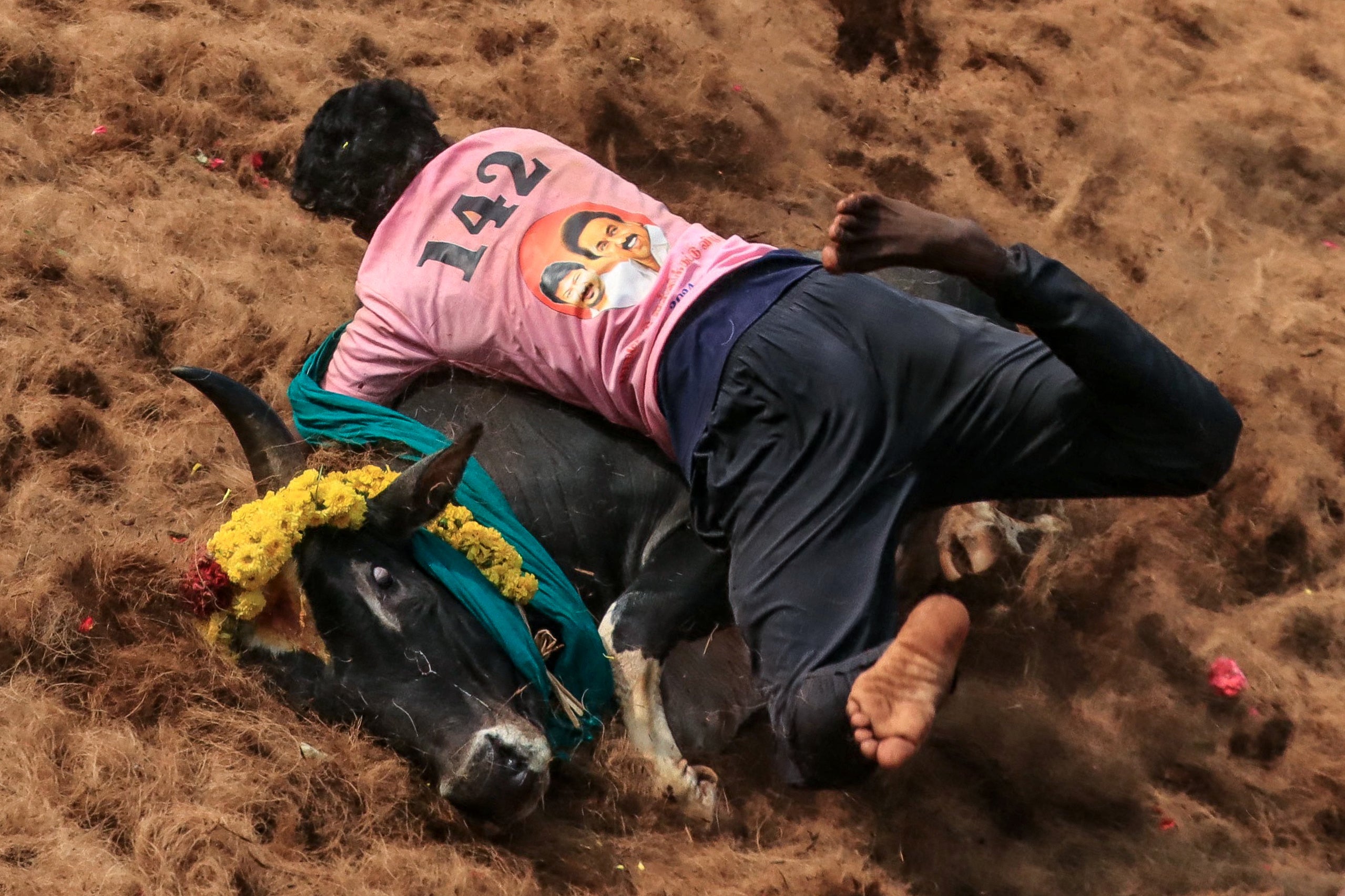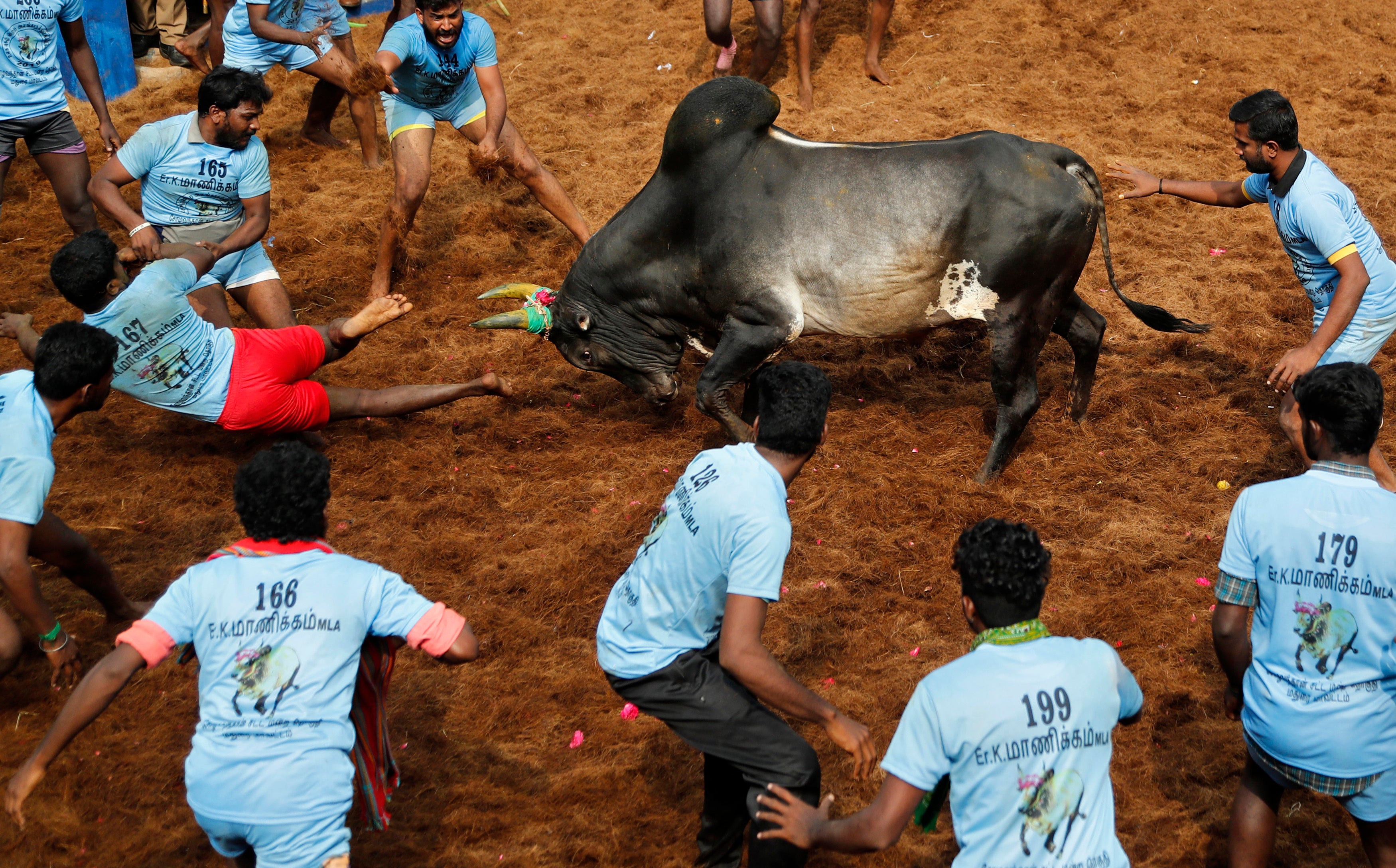Controversial bull-riding festival involving more than 12,000 animals gets underway in India
Bull-taming is celebrated as cultural heritage but criticised by animals rights groups
Your support helps us to tell the story
From reproductive rights to climate change to Big Tech, The Independent is on the ground when the story is developing. Whether it's investigating the financials of Elon Musk's pro-Trump PAC or producing our latest documentary, 'The A Word', which shines a light on the American women fighting for reproductive rights, we know how important it is to parse out the facts from the messaging.
At such a critical moment in US history, we need reporters on the ground. Your donation allows us to keep sending journalists to speak to both sides of the story.
The Independent is trusted by Americans across the entire political spectrum. And unlike many other quality news outlets, we choose not to lock Americans out of our reporting and analysis with paywalls. We believe quality journalism should be available to everyone, paid for by those who can afford it.
Your support makes all the difference.A controversial bull-taming festival has kicked off in the southern Indian state of Tamil Nadu with more than 12,000 bulls registered for the fights despite concerns from animal rights activists.
The Jallikattu sport, which is believed to be more than 2,000 years old, is extremely popular in Tamil Nadu during the three-day Pongal harvest festival in January in which hundreds of bull vaulters compete in a carnival-like festival.
However, the festival has suffered legal setbacks after it was banned over animal cruelty and public safety concerns.
As drums beat and the crowds cheer, a bull is released into a ring and the tamers try to leap onto the back one by one and try to hang on tightly on to its hump as the animal bucks and jumps. A man is declared a winner if he is able to hold on for three jumps or 30 seconds, or for a distance of 15m (49ft).
A car, a cash price of Rs 800,000 (£7500), and other prizes are up for grabs for the best bull tamer and the owner of the best bull will be awarded a tractor worth Rs 1,100,000 (£10,000), according to the Madurai city administration.
However, animal rights activists have raised concerns over the dangerous sport in which not only the tamers and spectators, but the bulls may also sustain fatal injuries.
Some reports suggest that the bulls are provoked to make them aggressive, using methods like twisting or pulling their tails, rubbing chilli powder on their eyes or poking them with sharp objects to control them.
PETA India, People for the Ethical Treatment of Animals, told The Independent in a statement that it will again appeal to the Supreme Court to ban jallikattu, as it had in the past.

Tushar Kol, advocacy associate for PETA India, said: “There is nothing religious about this violence and most people in Tamil Nadu state and the rest of India are kind and want nothing to do with jallikattu.”
“Jallikattu is nothing but dysfunctional grown men ganging together to bully vulnerable animals in a display of toxic masculinity. It is criminal under the Prevention of Cruelty to Animals Act, 1960 to chase, taunt, hit and bully bulls – yet this is what happens during jallikattu,” he said.
PETA said at least 126 humans, including children and 42 bulls have died since 2017.
According to the Madurai administration records, about 12,632 bulls and 5,347 tamers have registered for three Jallikattu events that happened in Alanganallur, Avaniyapuram and Palamedu, The Hindu reported.
On Tuesday, 1,100 bulls and 900 bull tamers will jump into the fray for the first day of the event in Avaniyapuram village, Madurai.
The Madurai district administration said strict rules had been imposed to ensure the sport is played safely and within the guidelines of Prevention of Cruelty to Animals Act, 1960.

According to the directions issued, each bull can participate only in one of the three competitions in the district and each bull can be accompanied only by its owner and a trainer familiar with the bull.
District police commissioner, Lokanathan, said over 2,000 police personnel have been deployed along with a bomb squad. Metal detectors have been placed and drone surveillance is being carried out to monitor the event.
The administration has also readied veterinary teams, ambulances, and fire service vehicles near the venues.
The controversial festival was first banned by a court in 2006 after a young spectator got attacked by a bull and died. It was later banned by the Supreme Court in 2014 on grounds of animal cruelty.
However, it began again in 2017 after it was legalised by the state through an amendment into a law following protests.
But the amendment was then challenged by animal rights organisations with petitions saying jallikattu is a bloodsport and dangerous, with the bulls often attacking their riders and bystanders as they tried to escape crowded areas.
In 2023, the Supreme Court ruled to allow the continuation of jallikattu, saying it was an “integral part of Tamil culture”.
PETA, a global animal rights organisation, which was one of the complainants in the case, denounced the verdict at that time. Activists argue that the risk to human life also makes the event unethical.
The festival in southern India is being held as the Uttar Pradesh government in the northern part of the country has organised the world’s largest religious gathering.
Nearly 400 million people including Hindu ascetics and pilgrims, are expected to take part in the 45-day, Maha Kumbh festival, the largest religious congregation on Earth, which began on Monday.

Join our commenting forum
Join thought-provoking conversations, follow other Independent readers and see their replies
Comments